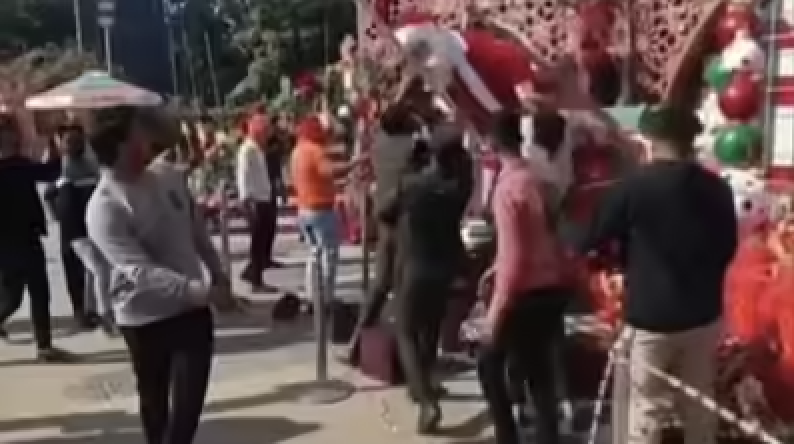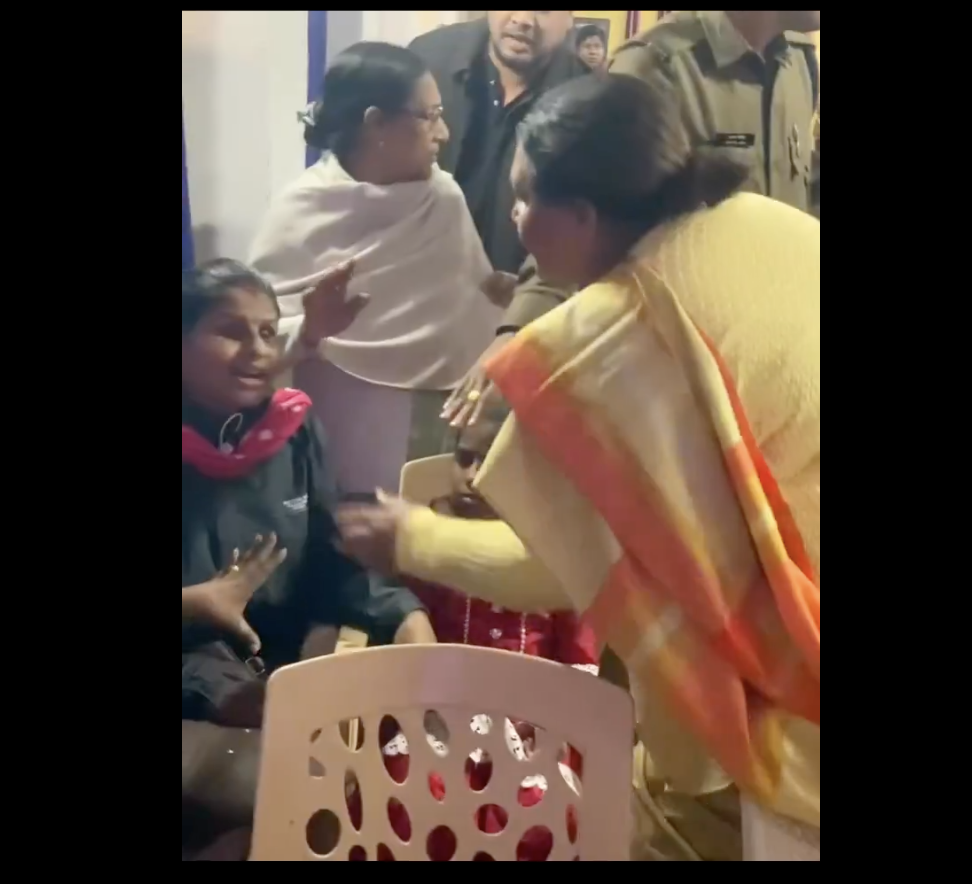By Jawed Naqvi
IT IS not difficult to accept that Pakistani establishment, particularly its right wing politicians and entrenched India-haters within the army and bureaucracy, share a vested interest in the rise of Hindu religious zealots to the helm of power in New Delhi.
It serves their purpose in several ways. The growth of groups like Bharatiya Janata Party, the RSS and the Shiv Sena rationalises and justifies the partition to Pakistanis. So that’s an important psychological victory straightaway. India is innately Hindu in the communal sense and therefore the Muslim League was right in demanding a separate homeland for Indian Muslims, the argument gets repeated ad nauseum.
The other reason for Pakistani right to exult at the rise of the Hindutva forces is perverse. What better way to destroy the very idea of India as a viable secular democracy than by encouraging fascist mindsets to surge and prosper in that country, ad lib the votaries of this approach. This is not a far-fetched plot. Right-wingers in the Pakistani establishment have succeeded to a large extent in creating a Hindu replica of what they have licked into shape in Pakistan in six decades.
This growing resemblance had prompted progressive Pakistani poet Fehmida Riaz to lament in her poem when she visited India under BJP’s care: “Tum bilkul hum jaise nikley, ab tak kahaan chhupe thay bhai?” (So you have turned out to be just like us, brother. It’s taken you a while to get there though.) A third and equally widely shared argument given by the Pakistani establishment to applaud the BJP’s hold in India posits that only a hard-line nationalist party in Delhi could solve the “core issue” with Pakistan.
It is of course left nicely unstated that the equation would also need Pakistan to be led by macho nationalists, and who better than the army to assume the role? Unfortunately, even left-oriented intellectuals on both sides of the border seem to subscribe to the view. Therefore, every time there was a lethal blast with heavy fatalities in India, and the government blamed the ISI, whether the spy agency was involved or inspired the perpetrators, the BJP gained in strength.
And given its affections for the BJP, the right wing establishment in Pakistan also must have felt good. For homegrown Indian Muslim groups, however, who stand accused of fomenting terrorist violence in India, it would seem preposterous to help fortify the BJP. Every time they carried out, if they did, a bomb attack at a temple or a busy bazaar they would have known that it could only recoil on them. It just didn’t make sense for an Indian Muslim group to vent its spleen against Hindutva leaders in emails to the media and then go on to attack innocent civilians in acts that could only be exploited by their enemies to win sympathy, and to target Muslim youths. It is this puzzle that may be about to be solved, wittingly or otherwise, by Indian sleuths. They appear to have unearthed a widely connected group of motivated Hindus in terror plots that were otherwise blamed on Indian Muslim groups.
This is a qualitatively new beginning in someone’s quest to revitalise faltering secular ideals of India. So who is this brave somebody who has picked up such amazing courage to call a spade a spade? It must require courage after all to link a serving lieutenant colonel in the Indian army to the bombing of the Samjhauta Express last year. Until last week the bombing of the Pakistan-bound passengers last year was being blamed on Pakistan, the ISI and terrorist groups based in Pakistan. The entire Indian establishment and much of the media were behind the thesis as is their wont. The sole political beneficiary of course was the BJP, its right wing sponsors and supporters. Now we are being told that a certain Lt-Col Shrikant Purohit had stolen 60kg of RDX explosives from the army’s warehouse in Jammu and Kashmir, transferring some of it to the perpetrators of the train blasts, which killed scores of Indian and Pakistani passengers.
Lt-Col Purohit is said to be a key player in a fanatical group called Abhinav Bharat, or New India. It has emerged as the unlikely hub of a terror network across the country. The discovery has embarrassed the army and it has backed a thorough probe. The outcome of the Purohit probe could determine the fate of democracy in India. The stakes are huge. The world is watching. So who is the gritty person who may have triggered what could be a decisive battle between fascism and democracy in India? Is it Prime Minister Manmohan Singh? It’s possible. He is in all likelihood prepared to call it a day after this tenure since the chances of the Congress winning the next elections because of his policies are remote. He has nothing to lose by taking a chance. Or is it Congress leader Sonia Gandhi? With the probe, she may have found the one big ticket that could clear the path for her party’s return to power. My own guess is that the ongoing investigations would not be possible without the involvement of National Security Adviser M.K. Narayanan, although the secular lobbies in the country seriously mistrust him. There was perhaps a hint of something like this about to happen, strangely enough, when the national security advisers of India and Pakistan found themselves in a potentially groundbreaking embrace last month. That was when the two agreed that the problems they now faced were “more internal than external”.
Was the impulse for the meeting a homegrown master move by Narayanan to help his bosses regain their secular halo or did it come from Washington as often happens between the two countries? The overriding American interest as we know is primarily to get its problems in Pakistan and Afghanistan sorted out. And to that effect, as President-elect Barack Obama has suggested, bilateral issues between Pakistan and India could not be left ignored. Which means: Pakistan should be asked to stop fomenting terrorism in India and India should deliver the doable in Kashmir and, now, in Afghanistan too where its influence worries Islamabad.
The problem is that Pakistan could only stop what it had started, but it could hardly be in a position to do much about something like Samjhauta Express bombing for obvious reasons. The problem appears to have been discussed between the two national security advisers. “I told the prime minister after today’s talks that I agree with you sir that we share a common destiny with Pakistan,” Narayanan told Mahmud Ali Durrani in a dinner speech that went largely unreported.
If this is so, a keen American interest under Obama in the threats posed by Hindutva militants, who derive their financial strength from America, cannot be ruled out. This despite claims by a few that somebody tainted with Hindutva is already in the Obama transition team. It was President Clinton after all who refused to agree with India’s official claims, when he visited Delhi in March 2000 that a group of Sikh civilians were massacred just then in Kashmir by Pakistani militants.
Clinton’s thoughts on the Chittisinghpura massacre are contained in former US Secretary of State Madeline Albright’s book titled: The Mighty and the Almighty Reflections on America, God, and World Affairs.
He wrote: “During my visit to India in 2000, some Hindu militants decided to vent their outrage by murdering thirty-eight Sikhs in cold blood. If I hadn’t made the trip, the victims would probably still be alive. If I hadn’t made the trip because I feared what religious extremists might do, I couldn’t have done my job as president of the United States. The nature of America is such that many people define themselves—or a part of themselves—in relation to it, for or against. This is part of the reality in which our leaders must operate.” Words of wisdom the new president would do well to heed.
This story was first appeared on dawn.com






